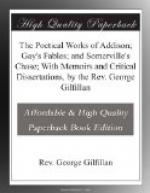From Genoa he went to Milan, and thence to Venice, where he saw a play on the subject of Cato enacted, and began himself to indite his celebrated tragedy, of which he completed four acts ere he quitted Italy. On his way to Rome, he visited the miniature mountain republic of San Marino, which he contemplated and described with much the same feeling of interest and amazement, as afterwards, in the Guardian, the little colony of ants immortalised there. Like Swift, (whom Macaulay accuses of stealing from Addison’s Latin poem on the “Pigmies,” some hints for his Lilliput,) Addison had a finer eye for the little than for the vast. He enjoyed Marino, therefore, and must have chuckled over the description of it in the geography, as much as if it had been a stroke of his own inventive pen. “Besides the mountain on which the town stands, the republic possesses two adjoining hills.” At Rome he did not stay long at this time, but as if afraid of the attractions of the approaching Holy Week—that blaze of brilliant but false light in which so many moths have been consumed—he hurried to Naples and saw Vesuvius burning over its beautiful bay with less admiration than has been felt since by many inferior men. He returned to Rome and lived there unharmed during the sickly season; thence he went to Florence, surveying with interest the glories of its art; and in fine he crossed the Alps by Mount Cenis to Geneva, composing on his way a poetical epistle to Montague, now Lord Halifax. The Alps do not seem to have much delighted his imagination. There are a few even still who look upon mountains as excrescences and deformities, and give to Glencoe only the homage of their unaffected fears, which is certainly better than the false raptures of others. But, in Addison’s day, admiration for wild scenery was neither pretended nor felt. Our poet loved, indeed, the great silent starry night, and has whispered and stammered out some beautiful things in its praise. But he does this, so to speak, below his breath, while the white Alps, seeming the shrouded corpses of the fallen Titans, take that breath away, and he shudders all the road through them, and descends delightedly to the green pastures and the still waters of lower regions.
At Geneva, where he arrived in December 1701, he remained some time, expecting from Lord Manchester the official appointment for which he was now qualified. But while waiting there, he heard the tidings of King William’s death, which put an end to his hopes as well as to those of his party. His pension, too, was stopped, and he was obliged to become a tutor to a young Englishman of fortune. With him he visited many parts of Switzerland and Germany, and spent a portion of his leisure in writing, not only his “Travels,” but his recondite “Dialogue on Medals,”—a book of considerable research and great ingenuity, which was not published, however, till after his death. From Germany he passed to Holland, where he heard the sad intelligence




